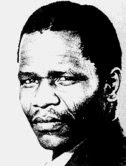 We all have a human right to self-defence. Two days ago, in a post to the mighty 800-strong YCLSA Discussion Forum, a comrade quoted the late Comrade Harry Themba Gwala (pictured) as follows: “If the warlords come to fight, you must fight; if they come to kill you, you must kill them.” This is the simple truth.
We all have a human right to self-defence. Two days ago, in a post to the mighty 800-strong YCLSA Discussion Forum, a comrade quoted the late Comrade Harry Themba Gwala (pictured) as follows: “If the warlords come to fight, you must fight; if they come to kill you, you must kill them.” This is the simple truth.In two successive issues of Umsebenzi Online, both linked below, SACP GS Dr Blade Nzimande, and Cde Solly Mapaila, SACP Secretary for Organising, Campaigns and Cadreship Development, have dealt with the recent sham furore that the friends of the bourgeois class have attempted to raise around this simple issue and around related claims of dictatorial power by the judiciary, amounting to barely-disguised tyrannical claims upon a monopoly of violence for the oppressors of the workers and the poor.
Just such an elite monopoly of violence, whether judicially sanctioned or de facto, was bequeathed upon more than 50 ex-colonial states of Africa through neo-colonialist manipulations, and it has caused untold suffering to the people of Africa. The monopoly of violence has been treated as a one-time trophy, and then turned against the free peoples. This monstrosity can be seen at this moment in Zimbabwe, where an electoral majority is daily being beaten down by bloody force, vile torture, and death.
COSATU has taken the initiative. See the historic third item below. Among other things it says (please note the events and the dates):
“We seek to declare Southern Africa an oppression-free zone and an oasis of justice and democracy for its people, who for years have suffered different forms of degradation, from colonialism through neo-colonial despotism to neo-liberal savagery with its resultant dehumanising poverty...
“The week from 10-17 August 2008 will be the busiest week in our international calendar this year, with the Zimbabwe and Swaziland Solidarity Conference hosted by COSATU on 10-11 August, the SADC Civil Society Conference on Zimbabwe on 12-14 August, the SACP African Conference on Participatory Democracy on 14-16 August, the SADC Heads of State Summit on 15-17 August, and COSATU’s mass rally on 16 August.”
The ANC has taken the initiative. See the historic fourth item below on the revival of liberation movements, by ANC President Jacob Zuma.
The SACP has taken the initiative. See the announcement of the SACP-hosted Conference scheduled for 14-16 August in Johannesburg (the fifth item below). Updated details are available on the SACP website, including a call for papers. Get your papers in quickly, comrades! There is serious business afoot!
The Communist University will not meet on Monday. Five years of work have not produced a collective cadre force that can keep the COSATU House sessions going, for the time being. Meanwhile, the command Asikhulume!! has repeatedly been heard and understood in the land. Consequently, comrades are meeting around the country in self-organised groups for umrabulo. There is arguably no need for a study circle located in the SACP head office. The Communist University was always “virtual”. It was never supposed to be centralised. A virtual university can never die. It is like a ghost. It is like the spectre of communism!
The “ghost” course on Karl Marx’s Capital, Volume 1 continues. See the last two links, below. Chapters 13, 14 and 15 were originally omitted from the schedule, to keep it brief, but they can still be accessed by clicking on the links in this sentence. Among other things, these chapters deal with work-organisation in an interesting and clear way.
Asikhulume!!
Click on these links:
Open letter to SA Human Rights Commission, Blade Nzimande, Umsebenzi Online (1560 words)
Judicial Dictatorship, Solly Mapaila, Umsebenzi Online (4875 words)
Oppression-free zone, oasis of justice and democracy, COSATU on SATUCC (801 words)
Revival and strengthening of liberation movements, Jacob Zuma (2213 words)
African Participatory Democracy Conference, Johannesburg, 14-16 July 2008 (brochure)
Capital, Volume 1, Chapter 12, Relative Surplus Value, Karl Marx, 1867 (4354 words)
Capital, Volume 1, Chapter 16, Absolute and Relative Surplus Value, Karl Marx, 1867 (4675 words)



















